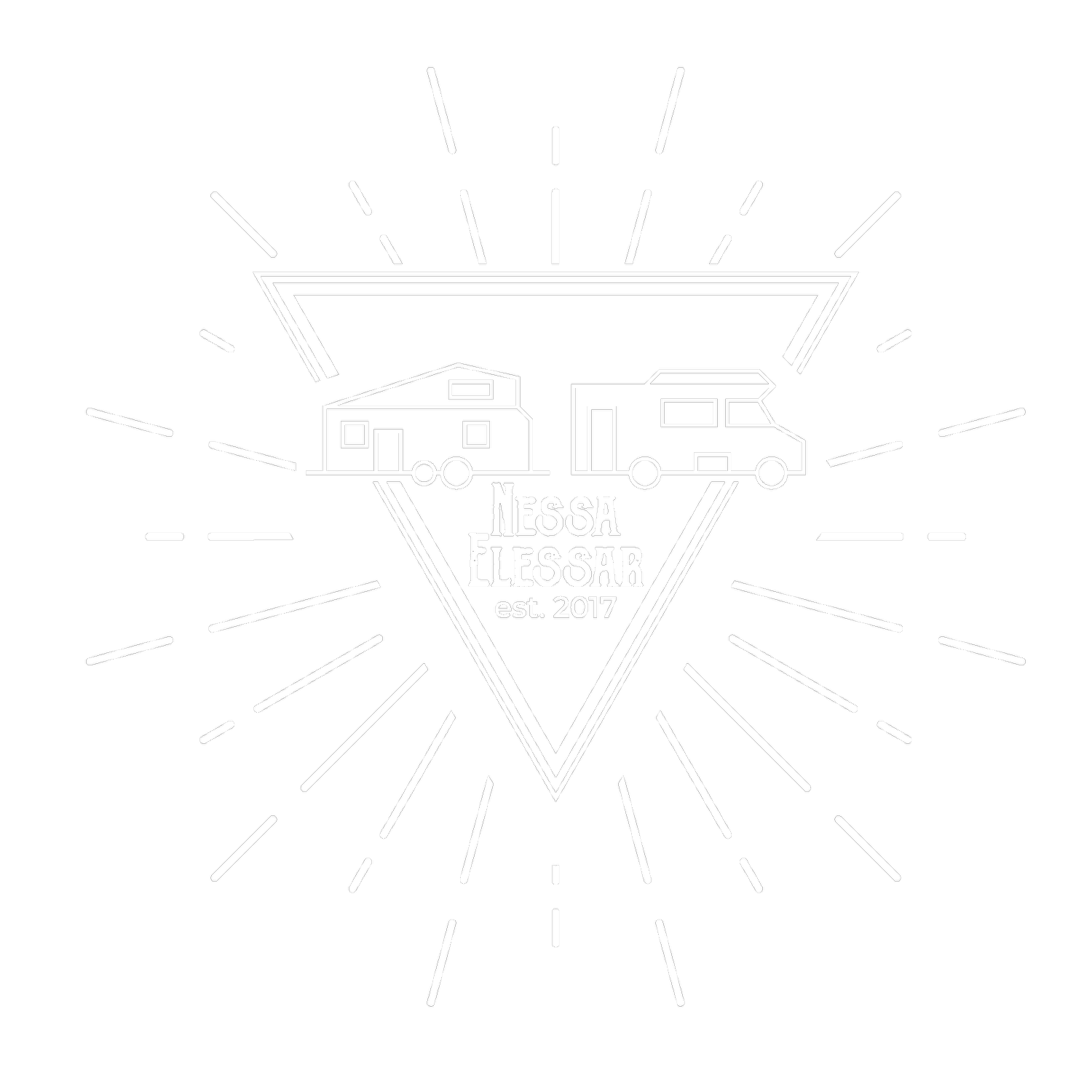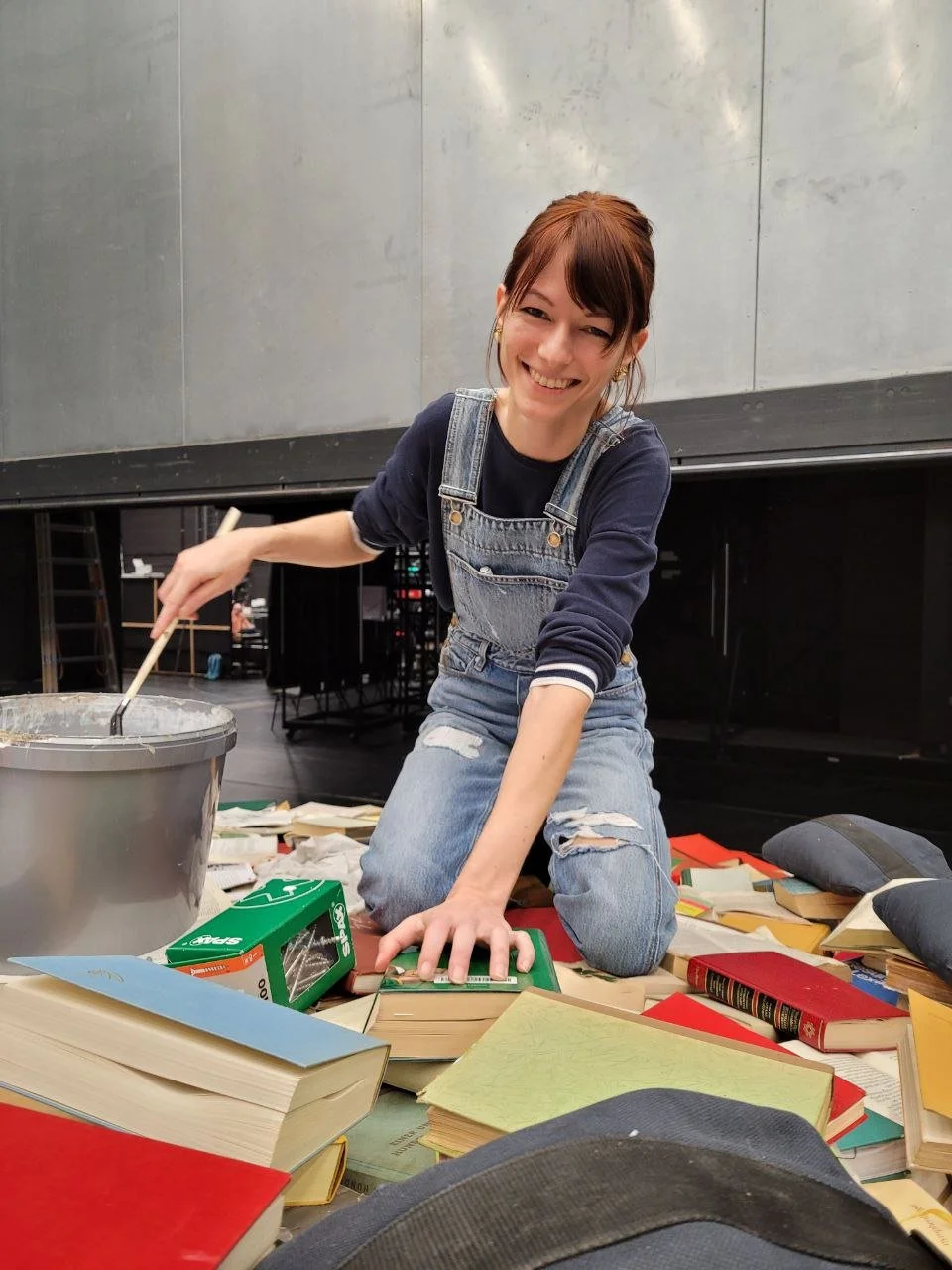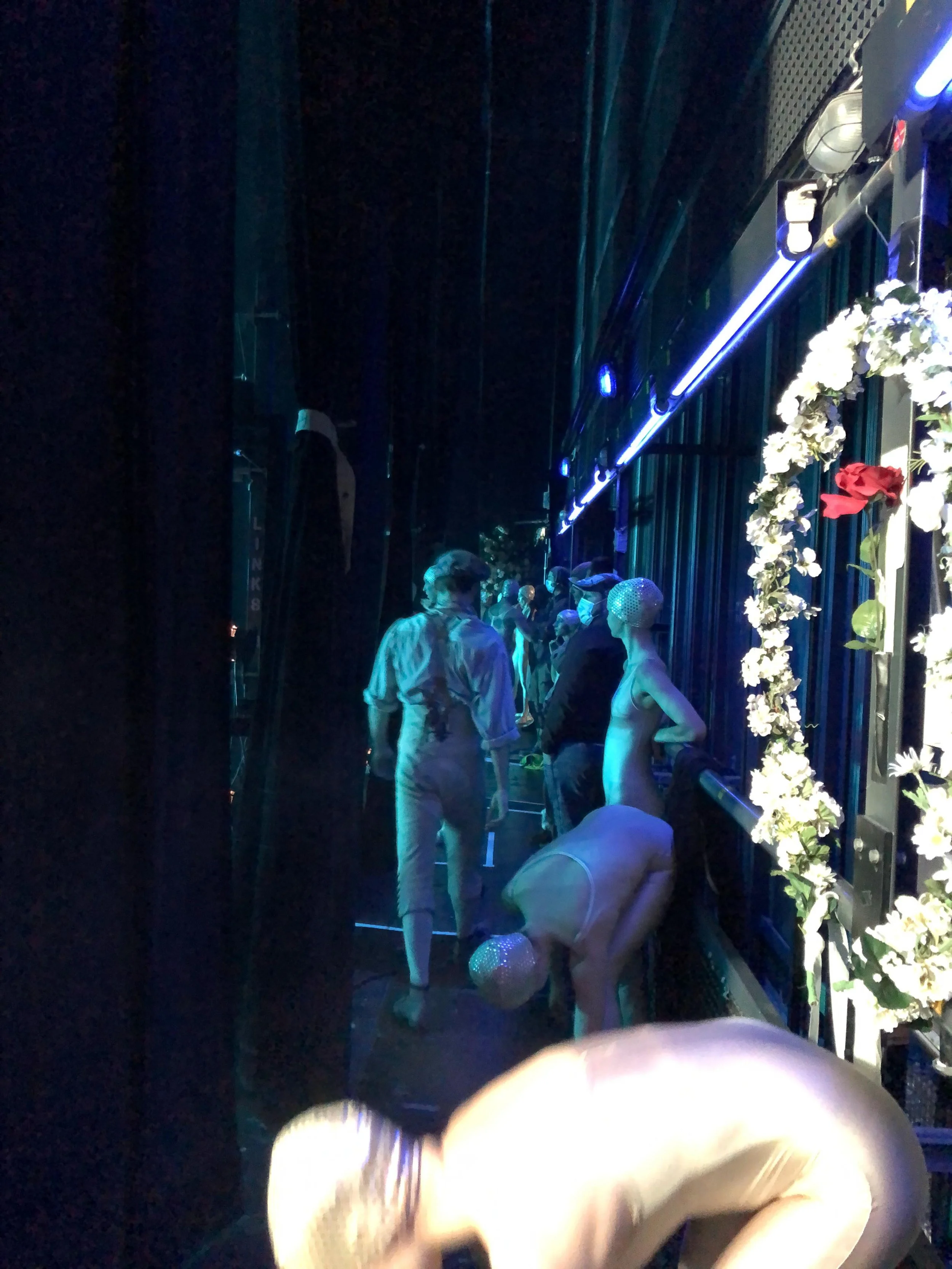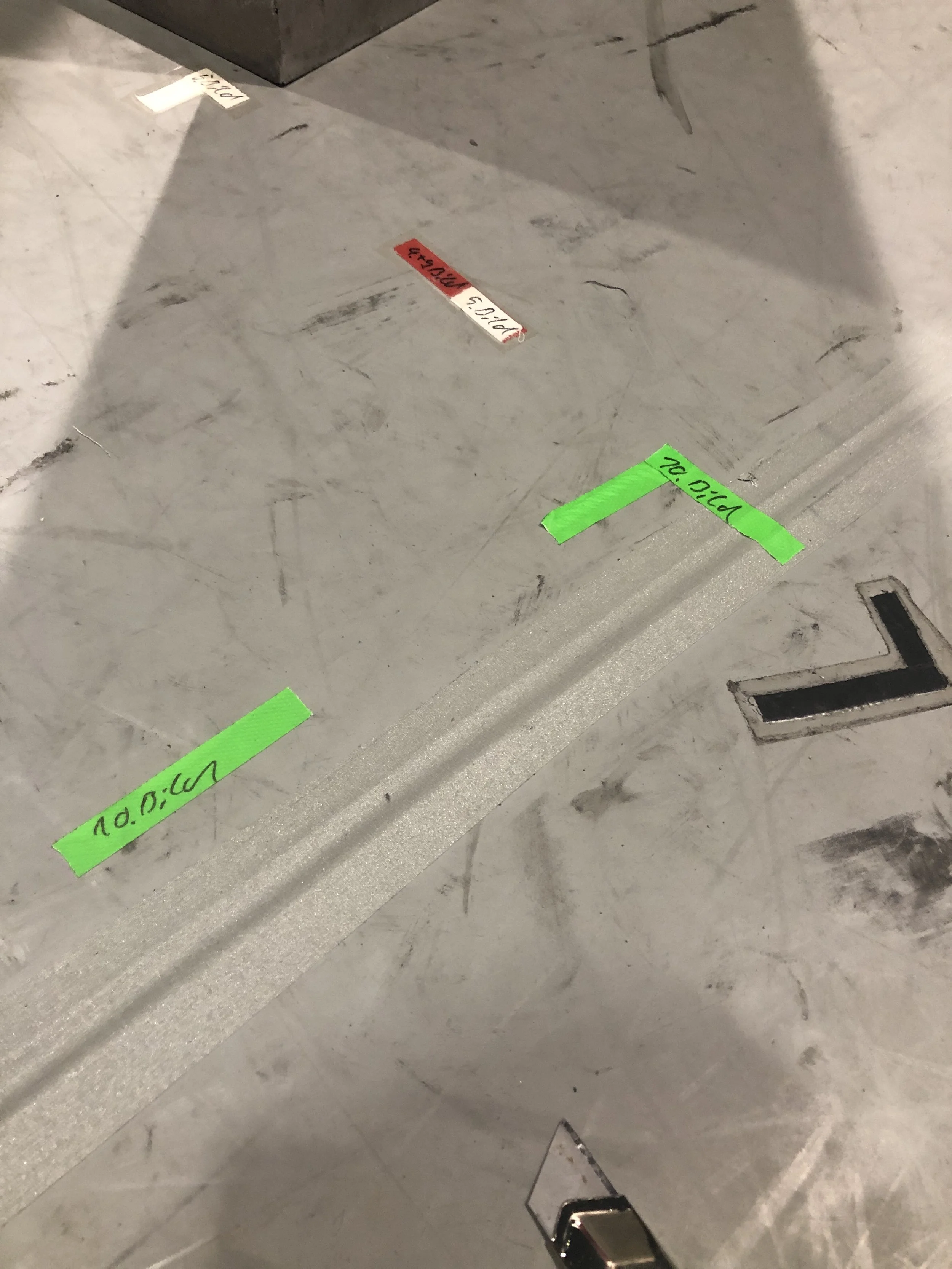The best job in the world
Happy Nessa gluing hundreds of books together for a set piece
I attended a 15 year graduation reunion the other week and it was surreal. Not only had most of the sixty or so attendants not seen each other in over a decade, we also collectively beamed and hugged when we arrived, as if we had all been best friends back then. Some clearly hadn’t been - but it simply didn’t matter anymore. Everyone was grown up and lived their life and it was delightful to exchange stories and update my picture of people I’d last seen when they were eighteen years old. It was a great night.
The question everyone prepares for on a night like this is obviously, 'So what do you do?' My reply often started with 'Well ...' and a short pause while trying to figure out how to explain it without needing a diagram. The thing I talked about the most, though, wasn't the tiny house or YouTube, it was my work in props. I might even have described it as ‘the best job in the world’ to someone, and I stand by that.
You, too, will have noticed that I speak about it highly. It’s not the naive excitement of someone new to the job (I’ve been doing it for seven years now, after all), it’s a deep appreciation for a mysterious, sometimes dysfunctional but always fascinating world in which things still run a little differently. Old-school, some would say. Let me finally properly introduce you to the strange microcosm that is a theater and explain why for many of us, stage life is the only life they will ever want.
view from the wings during a ballet performance. Little light, little space - trying not to get in anyone’s way is the priority
To get the basics out of the way: Every major stage production is run by dozens, sometimes hundreds of people in the background. Depending on where it’s happening and what it is, the timespan between the first rehearsal and the final performance can be days, weeks or years - especially for musicals and in repertory companies. I personally am working on projects that run for two weeks up to two months. We mostly do staged operas and ballets, some of which will be guest performances from other companies where we help out more, others will be our own productions where I am now in charge of all props.
Speaking of. There are, like I said, tons of people involved in a production - from dancers to accounting staff. The most common backstage professions are stage tech, lighting, sound, props, hair and make-up, costume and stage management, who runs the entire show and coordinates everything. (By which I mean, everything. I invite you to look at some footage.) All of these professions are invisible during performance. If we ever appear on stage, we will be disguised or in costume to blend in. Unless it’s one of those rare occasions (happened to me once in seven years), we don’t get to participate in bows.
Props are everything that is being used on stage that doesn’t count as costume or part of the set design itself. Often, this is furniture (some houses even have their own department for that) and a combination of all kinds of everyday life objects - jewelry, letters, cameras, flowers, sometimes food and sometimes also weapons. Depending on the production, it is a props manager’s task to manufacture or acquire, alter, repair and handle those props according to the director’s and cast’s needs. There are many things to consider, apart from design and general safety. Some surfaces cause unwanted reflections on stage, some materials are banned because they aren’t fireproof enough. Other times, objects need to have a certain weight or other functions (practical effects, hidden storage). Every production will be different.
Depending on the scale of it, we might spend up to six weeks just preparing props and only use them in four performances altogether. Other times I’ve handled old fabric or paintings that have been around for decades and have seen several hundred shows. Some of the guest performances I’ve worked on have been around since the eighties. Things constantly break and it’s your task to respectfully fix them.
coloring hundreds of fake flowers individually
Despite the sheer number of participants, an opera or ballet production usually feels rather intimate. Everyone I interact with to get my job done is right in the same gigantic room with me - on stage, backstage or somewhere in the workshop. I hardly ever have a situation where arrangements are being made entirely over the phone or e-mail, without ever seeing the person (which is super common in many jobs). If I need to discuss something with my boss, I go to his office, which is just a flight of stairs away. The dancers I need to talk to about the alterations I made to their weapons are in the dance studio and the director I need confirmation from is in the auditorium overseeing rehearsal. Everyone is right there.
And not just that: Everyone is right there all the time. With project-based work like mine, productions don’t stretch out too much. We build the set, we rehearse, we perform. And because of our schedules where no time is wasted, we see each other pretty much all day, every day, for weeks. We have to learn to get along, and because we’re practically in one big room, the mood between two people can quickly escalate to the whole team. Fights happen, of course they do. Surprisingly though, it has been proven time and again that even people who really can’t stand each other are able to work together when it comes to bigger things. If hundreds of others plus a large auditorium depend on you getting your act together, you do it.
The social environment in a theater in general is vastly different from what many people experience in their work life elsewhere. It is shaped not only by the intensity of the rehearsal process and the complexity of running the operation, it is also influenced by the culture around actors, dancers, singers and directors. Everything is - has to be - very hands-on. Like, literally. As an amateur actor, one of the first things you need to learn is to overcome this incredible caution around touching anyone else and showing emotion (obviously, healthy boundaries need to be established, which is a whole other conversation). It is a performer’s job to interact with other people on stage in a very physical kind of way, not just in dance. You will therefore see that the communication off stage, too, includes a lot more of that. There is a whole debate in our culture about touch-starvation and I’ve found that except for a very small number of bad actors (in a secondary sense) out there, the way we’re dealing with touch, which is a natural part of human interaction, is a lot healthier than in the corporate world (where inappropriate behavior is just as common). Everything is a lot heartier. People go out to celebrate after the premier. Many a night has been spent in random hotel bars or restaurants.
When you spend that much time together, something I’d like to call stage humor naturally develops. Lighting rehearsals are prone to rising levels of craziness because if you’re not a light engineer, you have nothing to do than to sit in the dark and wait for your cue - for hours. But also, you can’t run off because the cue might just come while you’re gone. I have personally been taped to a wall with duct tape out of someone else’s boredom. Ten roles of tape have been stacked on my head, with an added banana on top. Someone built an elaborate shrine for a schlager CD next to the stage manager’s desk. There have been Nerf Gun battles (including obstacle courses) and diverted mannequins - I swear I was only gone for a few minutes and they added inappropriate details to the poor guy. There have been attempts on my sanity by a colleague jumping out of the wings with an Anonymous mask on and the way dancers hype each other up while waiting on opposite sides of the stage for their entrance is a game of its own. We laugh a lot.
This obviously also comes from the way a production plays out hormonally. The buildup of (hopefully not too much) stress and anticipation over the course of a few weeks culminates in the excitement of opening night and the rush of emotions when the show has run successfully and you can hear the audience cheer and hoot. Everyone is happy, even if the video installation failed mid-play or the dancers accidentally dunked one of their props in the orchestra pit (musicians are generally not too happy to have a plastic bottle land in their lap while they’re playing). Because you’re performing on-point for a live audience, a flawless performance means much more than a flawless take in film. You have one chance to get it right. It feels meaningful that way.
markings on the floor for one of our shows - each piece of furniture or set design has a designated place in each act and we sometimes only have seconds to place it during a quick change
With props, there are a few peculiarities. You quickly learn to improvise because there is no rule book for how to build one hundred pink baby dolls that can be screwed together live on stage as part of the performance. How to hide a water flask in a costume to give the singer a five-second interval to drink during her performance of almost two hours. It’s always new, always different. You have to find your own way - which, again, feels more meaningful. And when it comes to it, your intricate solution either works or it doesn’t. You can’t talk your way out of your responsibility. Sometimes, the whole show depends on a single little mug, candle or necklace. I never have to ask myself: ‘Do I even matter in all this?’ I know I do.
The beauty of all this is that everyone has their role to play but no one carries the responsibility by themselves. Unlike with YouTube, where I am in charge of every single thing and always in the spotlight, I can just be a happy little gear. What we create on stage is bigger than the individual contribution, which is especially helpful on days when things don’t work out. Yes, you were late on the cue but your colleague helped you out and no one out there really noticed. When it comes to it, the team work backstage is unparalleled. During a recent ballet performance, cables got stuck in a fly bar, causing the power supply to a light to fail. It just so happened to be the most important light of the entire show that was due to have its moment in a few minutes. In the dark and while the act was already running, a solution was found amongst our colleagues and no one in the audience was ever the wiser.
As a workplace, the stage is not without its hazards. There is a reason why everyone gets a mandatory briefing before rehearsals start and there is also a reason why our mandatory liability insurances cover up to 10.000.000 Euros of damage. If your actions cause the sprinkler to activate in a room this size with wooden floors and curtains all around, then, well. Also, we’re working with potentially hot lights (by far not all of them are LED), all kinds of fabric (treated, but still) and, sometimes, live fire (candles, cigarettes etc.) on stage - all in the semi-dark with lots of people around. Tons of material are hanging above your head at any given moment. I’ve seen a light drop off the ten meter light bridge. It ain’t pretty. I’m pointing these things out because it adds to the overall sense that you have to be on top of your game when you come to work. Fumbling around with things you don’t know much about or not taking your responsibility seriously can cause other people great harm. What you do backstage matters in many ways. And as much as we all want our work environments to be safe, I always feel like stage life is very representative of the rest of life in this way: action - reaction (please read this with a French accent). I have learned many valuable lessons about that at work and it has actually translated into how I participate in traffic as well.
complex tech everywhere - pluck at the wrong cable and you’re busted
When I mentioned old-school in the beginning, I was referring to all of the above, but most importantly the handling of props itself. I am working with real things and real people. Yes, when managing a new production, I obviously spend time on my computer researching and putting together a database. But once production starts, most of my days are comprised of me actually having physical objects in my hands and actually delivering them somewhere on foot. It’s wild that we have to even say that but this is not a given in many jobs anymore. Props is one of those jobs that you can not ever do remotely. And I love that. The techniques we use to stain, age, repair, intentionally break objects have been around for decades or centuries. Up until recently, there was no formal training for the job (and it’s still not widely adopted). You learned from the people before you. And with the diverse backgrounds that I’ll talk about in a minute, there is always something to learn.
I already had an interest in classical music and ballet before I started this work, so I was especially appreciative of my opportunity to work with some of the most acclaimed artists in the industry. Name-dropping always feels kind of braggy and I already mentioned the Berlin Philharmonics in a previous post, which gives you enough of an idea. What I picked up from the directors, stage designers, conductors and dancers I met along the way has been truly inspiring and influenced my videography and my writing alike. I’ve found that for many of my colleagues, working in this field has opened them up to a much better understanding of music and art. For me, certainly - I used to be very puristic about classical music and ballet. After a few years in the industry, my taste is much broader and at the same time, much more refined.
When we sit together during lunch break or after the hours, we sometimes joke that backstage work is for the people who never got a grip in life. It is certainly a far cry from my initial plan to become a teacher - a steady, full-time job for the state. Now I work from project to project, self-employed, and I certainly make less money. But. What always fascinated me was how many different people come to work for opera and ballet - and how you would never guess that they love it like that. In our team, I am the only former dancer (I trained in ballet for a few years, sometimes up to three times a week) and not everyone is always up to speed with the plot of the opera we’re doing, but the dedication I see in a team so diverse always warms my heart. People from all walks of life, all countries and all social backgrounds come together, and that creates a space of respect and true diversity that I really appreciate. Maybe some of us do struggle to hold down other jobs that are less exciting, maybe some of us have a troubled past. It doesn’t really matter. We’re coming together to create something for the sole purpose of entertainment. We make people have a good time while they’re here. And it unites us when we feel like we have achieved that. Sometimes that’s enough to create a lasting bond.
In many ways, stage life is what I want life to be. It has community, it has real things, high stakes but also beautiful rewards, it has dedication, humor and a natural cycle to it. And it has art - which I have never been closer to than here. Just like anything good, it can be addicting and post production depression is a real thing. But to me, all of that is worth it. I’m not just working somewhere, I have a job to do. A responsibility to fulfill. A community to engage with. For that, I am eternally grateful.
side stage during performance - tons of people, everywhere, all the time
As I was standing there last weekend, explaining my professional situation and knowing full well that my year book had said ‘future profession: teacher and writer’, I grinned to myself. My own excitement got the better of me. I know that some people - not necessarily at the reunion - feel like I have ‘wasted my potential’ by not pursuing a career that makes use of my excellent grades and high achievements. Well. I’ve come to realize that above all, what I spend my time with should feel meaningful and give me a sense of belonging. Backstage work has a beautiful way of giving me that every single day and I hereby officially encourage everyone to look into it. We need good people. It’s never too late.
So now you know about the best job in the world. Well, at least a little bit. I personally think there are many best jobs out there who combine all of these elements - or even more (for instance, I see very little sunlight at work). The point is: They are out there. I never knew about many of them growing up. Thankfully, now I do. And now you do too. I’m writing this while packing my bags - I will be working across the country for a new ballet production next week and I’m excited. Since this has come up quite spontaneously, the next episode on my channel will be delayed a little. In the meantime, take care and please never settle for a job you hate. Peace out.






